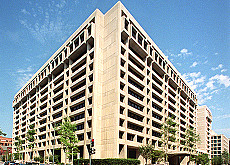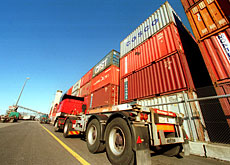IMF offers advice on Swiss financial stability

The International Monetary Fund has found the Swiss financial system resilient to significant shocks but says Bern could do more to strengthen supervision.
The recommendation is contained in an IMF assessment update on Switzerland’s financial system stability, published on Monday.
In particular, the IMF said there was scope to strengthen the draft act on establishing the planned Financial Market Supervisory Authority (Finma).
Finma, which is aimed at unifying supervision of banking, insurance, securities and anti-money laundering, is due to become operational in 2009.
As a first measure, the new body would include the Swiss Federal Banking Commission and the Federal Private Insurance Office.
The IMF believes the new watchdog body should have the authority to impose financial penalties and not the Swiss finance ministry, as foreseen in the draft legislation.
However, the ministry said it did not share the IMF’s reservation on the issue, arguing its plans did not run contrary to the new authority’s independence.
Another recommendation was for a strengthening of the supervision of Switzerland’s two big banks – UBS and Credit Suisse – concerning liquidity risks.
Some weaknesses
In other observations, the IMF said there were “some weaknesses” in Swiss insurance regulation, noting that several companies were found to be too vulnerable to financial and real asset price drops.
On the pension front, the IMF said that pension supervision remained “fragmented” and uneven among cantons, carrying risks. It commented that underfunding needed to be resolved and integrity standards upgraded.
It argued in favour of a central body that would coordinate regulation, moving to a system with higher valuation reserves and tighter integrity standards.
In the banking sector, the IMF said there was a favourable climate in which any risks came basically from external factors.
But it argued that cantonal banks should focus on profit maximisation and be given further operational independence.
It found that cantonal banks were less efficient than private banks, partly because they had to carry out social functions with contingent risks.
swissinfo with agencies
The IMF has warned that the Swiss franc has to be watched closely because of the increase in carry trades.
It noted that carry trades – in which investors borrow in low-yielding currencies such as the franc to raise funds for investing in high-yielding currencies, could be temporarily weakening the franc to a level below its equilibrium rate.
The Swiss franc is trading at near eight and a half year lows against the euro as investors exploit Switzerland’s low benchmark interest rate of 2.25%.
The IMF said it was not clear whether the franc’s weakness was temporary.
The IMF’s executive board said Switzerland’s economy continued to perform well, with low inflation and strong employment growth backed by flexible labour markets, and the short-term growth outlook was “strongly positive”.
It repeated its existing growth forecast of around 2% for the Swiss economy for 2007.
IMF directors commended the Swiss National Bank’s success in keeping inflation “well under control”, and considered the recent gradual tightening of monetary policy appropriate.

In compliance with the JTI standards
More: SWI swissinfo.ch certified by the Journalism Trust Initiative


You can find an overview of ongoing debates with our journalists here. Please join us!
If you want to start a conversation about a topic raised in this article or want to report factual errors, email us at english@swissinfo.ch.